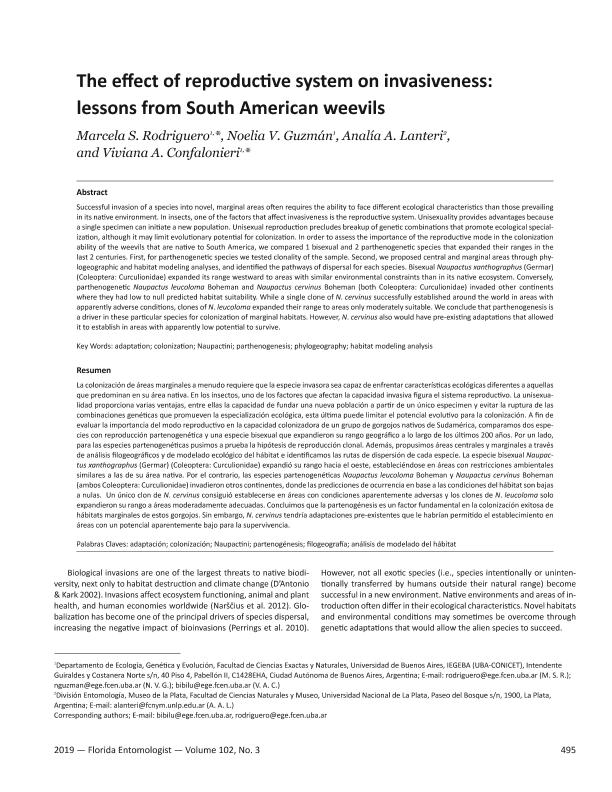Artículo
The Effect of Reproductive System on Invasiveness: Lessons from South American Weevils
Rodriguero, Marcela Silvina ; Guzman, Noelia Veronica
; Guzman, Noelia Veronica ; Lanteri, Analia Alicia
; Lanteri, Analia Alicia ; Confalonieri, Viviana Andrea
; Confalonieri, Viviana Andrea
 ; Guzman, Noelia Veronica
; Guzman, Noelia Veronica ; Lanteri, Analia Alicia
; Lanteri, Analia Alicia ; Confalonieri, Viviana Andrea
; Confalonieri, Viviana Andrea
Fecha de publicación:
09/2019
Editorial:
Florida Entomological Society
Revista:
Florida Entomologist
ISSN:
0015-4040
Idioma:
Inglés
Tipo de recurso:
Artículo publicado
Clasificación temática:
Resumen
Successful invasion of a species into novel, marginal areas often requires the ability to face different ecological characteristics than those prevailing in its native environment. In insects, one of the factors that affect invasiveness is the reproductive system. Unisexuality provides advantages because a single specimen can initiate a new population. Unisexual reproduction precludes breakup of genetic combinations that promote ecological specialization, although it may limit evolutionary potential for colonization. In order to assess the importance of the reproductive mode in the colonization ability of the weevils that are native to South America, we compared 1 bisexual and 2 parthenogenetic species that expanded their ranges in the last 2 centuries. First, for parthenogenetic species we tested clonality of the sample. Second, we proposed central and marginal areas through phylogeographic and habitat modeling analyses, and identified the pathways of dispersal for each species. Bisexual Naupactus xanthographus (Germar) (Coleoptera: Curculionidae) expanded its range westward to areas with similar environmental constraints than in its native ecosystem. Conversely, parthenogenetic Naupactus leucoloma Boheman and Naupactus cervinus Boheman (both Coleoptera: Curculionidae) invaded other continents where they had low to null predicted habitat suitability. While a single clone of N. cervinus successfully established around the world in areas with apparently adverse conditions, clones of N. leucoloma expanded their range to areas only moderately suitable. We conclude that parthenogenesis is a driver in these particular species for colonization of marginal habitats. However, N. cervinus also would have pre-existing adaptations that allowed it to establish in areas with apparently low potential to survive.
Archivos asociados
Licencia
Identificadores
Colecciones
Articulos(IEGEBA)
Articulos de INSTITUTO DE ECOLOGIA, GENETICA Y EVOLUCION DE BS. AS
Articulos de INSTITUTO DE ECOLOGIA, GENETICA Y EVOLUCION DE BS. AS
Citación
Rodriguero, Marcela Silvina; Guzman, Noelia Veronica; Lanteri, Analia Alicia; Confalonieri, Viviana Andrea; The Effect of Reproductive System on Invasiveness: Lessons from South American Weevils; Florida Entomological Society; Florida Entomologist; 102; 3; 9-2019; 495-500
Compartir
Altmétricas



